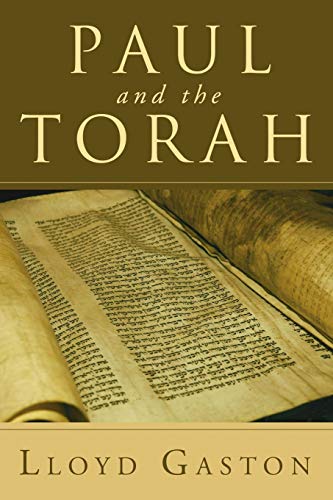File:1987 * Gaston.jpg
1987_*_Gaston.jpg (333 × 500 pixels, file size: 31 KB, MIME type: image/jpeg)
{en} Paul and the Torah (1987) is a book by Lloyd Gaston.
Abstract
"While the task of exegesis after the Holocaust has been to expose the anti-Judaism inherent in the Christian tradition, the founding of the Jewish state has also helped show the continuation of the covenant between God and Israel. For Lloyd Gaston the living reality of Judaism makes possible a better understanding of Paul's prophetic call as Apostle to the Gentiles. In "Paul and the Torah", Gaston argues that the terms of Paul's mission must be taken seriously and that it is totally inappropriate to regard his "conversion" as a transition from one religion to another. Paul's congregations were not made up of Christian Jews: they were exclusively Gentile. Thus Paul focused on God's promises to Abraham concerning Gentiles which were fulfilled in the faithfulness of Jesus Christ. The inclusion of Gentiles in the elect people of God through their incorporation into Christ thus does not mean a displacement of Israel. Nowhere does Paul speak of the rejection of Israel as God's chosen people, of the Sinai covenant as no longer in effect for Israel, or of the church as the new and true Israel. He also says nothing against the Jewish understanding of Torah as it applies to Israel when he speaks of "law" in reference to Gentiles. But for those outside the covenant God made with Israel, the law acted in an oppressive and condemning way, and Gentiles needed liberation from it. "Lloyd Gaston is professor of New Testament at the Vancouver School of Theology. He is a past president of the Canadian Society of Biblical Studies and author of "No stone on another: studies in the significance of the Fall of Jerusalem in the Synoptic Gospels."--Publisher description.
"In thought provoking and experimental fashion, Gaston goes against the common Christian exegetical tradition which argues that Paul abrogated the Torah and attacked Judaism. Instead, Gaston offers a fresh study on Paul, proposing that the apostle never fought against Judaism or Israel but that his message was solely addressed to Gentiles. Gaston thinks that Paul's message comes close to the two covenant theology of certain modern thinkers such as Rosenzweig, insisting that for Paul there was a righteousness made available to the Gentiles through the faithfulness of Christ, while the righteousness from the covenantal Torah continued to remain valid for Israel. What Paul held against his Jewish contemporaries was that they refused to recognize the eschatological age which had been ushered in by Christ which allowed for Gentiles to share in the same benefits of election as Israelites without having to observe the Torah. --Isaac W. Oliver
Editions
Published in Vancouver, Canada: University of British Columbia Press, 1987.
Table of contents
External links
- [ Google Books]
File history
Click on a date/time to view the file as it appeared at that time.
| Date/Time | Thumbnail | Dimensions | User | Comment | |
|---|---|---|---|---|---|
| current | 17:39, 13 September 2022 |  | 333 × 500 (31 KB) | Gabriele Boccaccini (talk | contribs) |
You cannot overwrite this file.
File usage
There are no pages that use this file.
